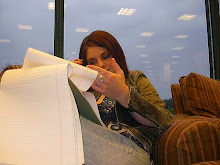On July 18th, 2008, my determination to be a published author was temporarily shattered by some very unfortunate news.
It was a Friday, the day before my birthday, and I was very excited. I was going to see The Dark Knight with friends the next day, and I had a partial with an agent that I had a great feeling about. I had commented on her blog, sent her well-wishes when she was sick, and she had actually commented back on my blog. We had a bit of a relationship brewing, which is exactly what you're supposed to be doing with agents.
On my lunch break at work, I went to check my email on my phone, and I saw the worst thing EVER.
A form rejection letter.
I had gotten a lot of these before, but never from someone that I had actually networked with. I thought that maybe, since she knew who I was (I made a point to tell her), she would at least give me a few pointers. But no, not a word. It broke my heart.
Rejection is something that we all have to deal with in life. We get rejected by schools, jobs, friends, romantic interests, customers, and institutions all the time. And every single time, it sucks, especially when what is getting rejected is something that has been labored over, cultivated, and worked on for months or even years. I think that we give a bit of our souls to every creative effort, and it can really be brutal when our creations don't measure up. But it does good to remember that rejection is just as inevitable as death and taxes. Sometimes , no matter how we might try or what we might do, we are just not the right fit.
Even though creative people are by nature sensitive, it's absolutely necessary to develop a thick skin. Unless you're purely doing something for yourself, without the intent to have the world scrutinize it, any effort that is put out for the pubic to enjoy will be put under the magnifying glass. The agenting process is a good way to develop that thick skin, to not be devastated when someone doesn't like something, and to be able to learn how to take criticism, absorb the good critiques and shed the bad.
Rejection can also be very good fuel for moving into an unexpected direction. After I recovered from my crushing defeat, I sought out a professional editor for a consultation on my manuscript. He tore that sucker apart, but he gave me a lot of good tips and tricks, and a lot of really worthwhile feedback on my strengths and weaknesses. His help was exactly what I needed for the project that I'm about to shop. I figured, that if everyone thought that my manuscript was not publishable, maybe it was the manuscript's problem, and not just a fact that I didn't hit on the right agent or that maybe the market was moving away from what I was doing, and if I could fix what I had done wrong that was repeatedly missing the mark, then I would have greater success.
This is not meant to be a "pick yourself up, dust yourself off, and chin up, slugger, you're a winner" post... I don't really do that. But if you are a writer, don't worry. You are not alone. We have all been rejected, we have all been turned down, for whatever reason, and I am right here with you on the Reject Bus. However, the Reject Bus is a journey, not a destination. There will be a time when your stop comes up.
